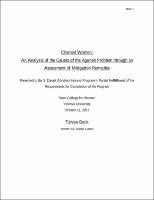Please use this identifier to cite or link to this item:
https://hdl.handle.net/20.500.12202/4243| Title: | Chained Women: An Analysis of the Causes of the Agunah Problem through an Assessment of Mitigation Remedies |
| Authors: | Beck, Tzivya |
| Keywords: | Agunahs. Divorce (Jewish law) --History. Divorce --United States --History. Divorce --New York (State) --New York --History. Husband and wife (Jewish law) --History. Rabbinical literature --History and criticism. Jewish women --Conduct of life. |
| Issue Date: | Oct-2017 |
| Publisher: | Stern College for Women |
| Abstract: | Even in today’s democratic society, many Orthodox Jewish women suffer in dead marriages because their husbands refuse to give them a get1 (Jewish divorce). These women, known as agunot2 (literally “chained women”), cannot remarry lest they be considered adulteresses and their children be considered mamzeirim (bastards), all of whom are ostracized by society.3 Often, these women must submit to extortion by their husbands in the form of demands for financial compensation and on matters of child custody. In the Talmud, a less sinister version of the agunah problem existed; the classic case discussed in the Talmud describes a woman whose husband has been lost in war or while travelling, and there is no one to testify whether he is still alive. In the past decades, and especially with the decentralization of rabbinic authority in the Jewish community, the sinister version of the agunah problem has emerged. |
| Description: | The file is restricted for YU community access only. |
| URI: | https://hdl.handle.net/20.500.12202/4243 https://ezproxy.yu.edu/login?url=https://repository.yu.edu/handle/20.500.12202/4243 |
| Appears in Collections: | S. Daniel Abraham Honors Student Theses |
Files in This Item:
| File | Description | Size | Format | |
|---|---|---|---|---|
| Tzivya Beck.pdf Restricted Access | 373.54 kB | Adobe PDF |  View/Open |
This item is licensed under a Creative Commons License

